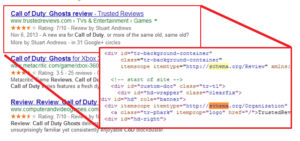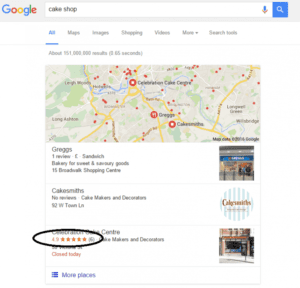Local SEO is the process of optimising your website for local results in search engines. Your website visibility will depend on the search of users and their specific location matched with your business details and website link.
[bctt tweet=”Consumers respond better to location specific search results”]
It’s important that you’re always appearing in the search engine for particular local results so that online users actually discover your products and services. Local SEO just like regular SEO requires on and off page optimisation.
The first thing to ensure is that your business actually has a physical location so that you can master local optimisation. Even if your company provides services in a different area, it’s easier to rank with geo-keyword phrases if your physical location matches the Google results. People who don’t know your business and are searching globally may be looking for a ‘cake shop’, and Google will list appropriate results. If somebody is searching for a ‘cake making shop in exeter’ you need to ensure that your website will appear to them in order to increase click-through rate and conversions.
If you have a local presence e.g. a building company or shop then it’s important to be found by the potential local customers. Once you have a Google My Business listing, your map and location marker will appear to online users in the search engine.
To gain the best possible rankings for your business, your website should contain well-written and relevant content for the best user experience and search engine factors. Google and other search engines use particular signals to decide which pages and websites display above and below others after an online user types in a query.
The best place to start is making sure that all pages of your website contain these SEO basics –

When optimising for local search, there are specific items to focus on in order to make sure that your website displays for certain geographical keywords such as Exeter, London, Bristol.
Your address should also be mentioned on your website in Schema format. Marking up pages with Schema microdata makes it easier for search engines to properly categorise site content.
It’s also recommended to place your business address in the header or footer of your website so that it’s visible on every page.
Google My Business connects you directly with your customers when they search for your services or company via the engine, maps or Google+. Information is listed so that customers can find you immediately regardless of the device used. Providing online users with the right information at the right time including hours of operation and a phone number means that they can instantly get in touch. Helping you build a loyalty base, Google My Business is a real factor to the contribution of successful local SEO.

What should my Google Business listing include?
These factors will contribute to the success of your Google My Business listing:
An online review is a short write-up or rating based on user experience of your website, ser vices or products.
vices or products.
Local reviews have been proven to consistently help towards search rankings.
Many companies overlook the importance of reviews and how they are shown to improve customer trust, loyalty and further entice people to connect with your services.
How can I get a client to review my business?
There are three basic ways that a user can provide a review of your company. Making it easy for a consumer to provide a comment is the best way to acquire a positive one. This is pretty much free advertising and contributes to local SEO improvement.
Checking your Google Analytics to see which keywords are already bringing website traffic will help you understand which keywords are already bringing in website traffic. From this you can optimise pages based on your physical location. For example, if you’re an Injury Lawyers based in Bristol, using ‘injury lawyers bristol’ in your title tag, body content and H tags will help the search engine to understand that this is what you do.
Google Keyword Planner is a useful place to start, this tool will help you discover which phrases and keywords are gaining the most searches and are most relevant to your business.
Consistency is key and your business being mentioned through online directories will help users to find your business and search engines to recognise it. Accurate and informative information on the website regarding your business is important to the success of regular and local SEO.
How do I create a successful business listing?
Check out these top business directories to submit your business details to. Remember, links back to your website are about quality, not quantity.
Always ensure that you have a 100% Moz local listing to ensure that your business information is being correctly used across the web. You’ll have a section that shows you if you have any duplicate listings.
A successful guide to using Google My Business:
Setting up and optimising Google My Business will help with local search results. Don’t try to keyword stuff your business listing as this appears unnatural to the search engine and the potential customer. Extra information can be added and updated at later dates to keep the information relevant and informative.
Ok, let’s recap and take a look at the top SEO factors that will contribute to your local online presence.
Mobile signals – Having your website optimised for a phone or tablet can help improve your local SEO as searcher’s using one of these devices will be shown if your website is mobile friendly.
[bctt tweet=”77% of mobile device users contact a business after conducting a local search! @mediastreet”]
Don’t underestimate the impact of local SEO, get your website locally optimised and improve your search presence today! Check out our local SEO services at Media Street.